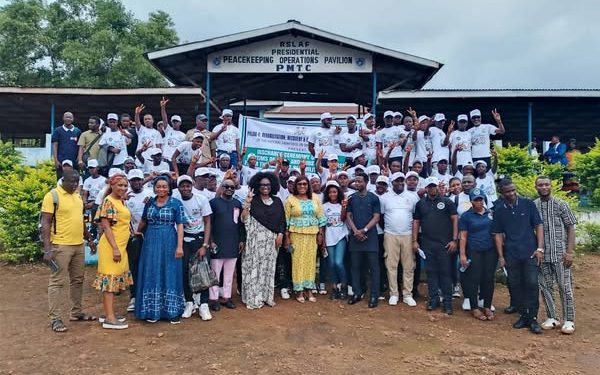Freetown, July 2025: The Ministry of Social Welfare on Thursday, 24th July, 2025, successfully discharged forty-nine rehabilitated individuals from the Hastings Rehabilitation Center (PMTC) in Freetown, marking a major milestone in Sierra Leone’s ongoing battle against drug and substance abuse. The reintegration ceremony highlights Government’s commitment to human capital development and youth empowerment which are pivotal in President Julius Maada Bio’s development agenda.
The ceremony which Underscores National Commitment to Rehabilitation was chaired by Director Ansu Konneh, who doubles as the Director of Mental Health and Psychosocial Support at the Ministry of Social Welfare.
In his opening remarks, he commended the courage and determination of the recovered individuals and encouraged them to embrace their second chance with optimism and purpose.
He emphasized that the government’s rehabilitation program aims not only to treat addiction but also to restore dignity and enable full societal reintegration.
The event saw strong cross-sectoral participation from government institutions and development partners, all pledging continued support for rehabilitation and reintegration efforts.
The Director of Non-Communicable Diseases and Mental Health Division, Mr Ishmael Kebbie praised the Ministry of Social Welfare for its leadership in addressing drug addiction. He reaffirmed the Ministry of Health’s commitment to providing both medical and psychological support to enhance the success of rehabilitation programs.
The Secretary General of the Sierra Leone Scouts Association,
Mr. Sylvester T. A. Renner, highlighted the importance of youth empowerment in the fight against drug abuse. He announced plans to implement skills training and mentorship programs to help reintegrate individuals to rebuild their lives.
The Representative from the Ministry of Defence,
Brigadier General Williams T. Pessima expressed the military’s support for national anti-drug efforts, stressing that safeguarding the country’s youth is vital to national security and stability.
The Deputy Minister of the Ministry of Youths, Patrick Michaelson Gibrilla outlined ongoing collaborations with international partners to provide sustainable economic opportunities for young people. He encouraged the rehabilitated individuals to become ambassadors of recovery and change in their communities.
Delivering the Keynote address, Mrs Melrose Karminty, Minister of Social Welfare, hailed the program’s success as a clear reflection of President Bio’s Human Capital Development vision. She emphasized that the rehabilitation initiative had commenced even before the President’s formal declaration of a national emergency on drug abuse—demonstrating proactive leadership and governance.
The Minister revealed that 23 of the 49 discharged individuals were university students prior to their addiction, underscoring the devastating impact of drug abuse on the country’s educational system. “We cannot afford to lose a generation to drugs. Rehabilitation must lead to education and employment,” she stated.
She also highlighted a pressing social concern: that 80–90% of those affected by substance abuse are cared for by mothers, while fathers are often absent during both rehabilitation and registration processes. “This trend reflects a troubling pattern of neglect and irresponsibility that must be urgently addressed,” the Minister added
The Minister of Social Welfare calls on all stakeholders—including government agencies, civil society organizations, and international partners—to strengthen collaboration in the national response to substance abuse.
She emphasized that sustainable change requires a holistic and united effort—ranging from prevention and treatment to education and long-term reintegration.
“As Sierra Leone intensifies its anti-drug campaign, this milestone ceremony serves both as a celebration of progress and a sober reminder of the challenges that remain. The government remains fully committed to transforming the lives of victims of substance abuse into stories of recovery, reintegration, and contribution to national development.” She concluded.
Creditt: Abu Bakarr Sama











